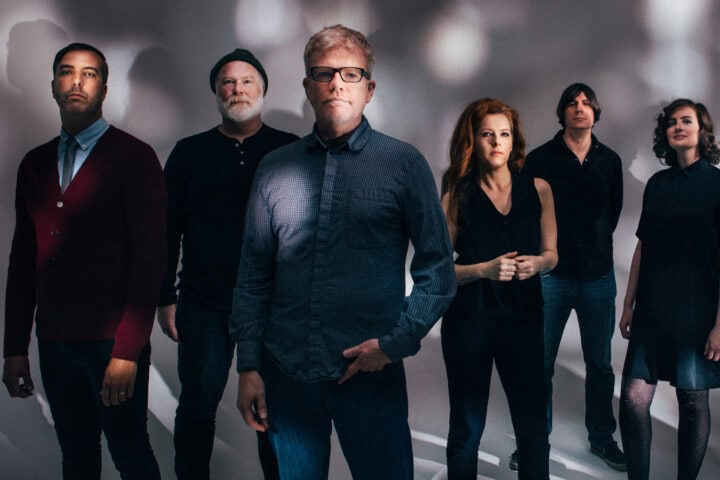When, on the Hold Steady’s 2004 track “Barfruit Blues,” a woman offers frontman Craig Finn a snide “It’s good to see you back in a bar band, baby,” his sarcastic rejoinder to her—“It’s great to see you still in the bars”—does little to mask the fact that they’re both hanging on to a scene that’s starting to pass them by.
The Hold Steady, of course, is no ordinary bar band. Their anachronistic love of classic rock and songs about “kids out on the East Coast, roughly 20 years old”—as Finn puts it on “Certain Songs,” another track from their debut, Almost Killed Me—ensured that their time at the vanguard of indie rock would be an inevitably fleeting one. It’s one thing to sing about hardcore-obsessed twentysomethings buying drugs from messianic gang leaders over crunchy arena-rock riffs when you’re 30, but if you’re still doing it at 50, it starts to sound like a midlife crisis.
Finn fearlessly confronts this quandary on “Sideways Skull,” the lead single from the Hold Steady’s aptly titled ninth album, The Price of Progress. He finds himself in a halfway house, accosted by a seemingly delusional hard-rock poser wielding “a hairbrush mic and a fantasy band.” “We’re gonna do a show at the Pyramids,” she insists, before regaling him with embellished tales of her rock ‘n’ roll past. He rolls his eyes but, in the song’s final chorus, reveals that he’s no different: “I’ve got a band too…We’re probably touring Europe.”
There’s no denying that the glory days are over for the wayward souls in the halfway house, but that doesn’t mean that they’ll never rock again. Indeed, while Finn weaves this tale, the band works up a maelstrom of snarling guitars and machine-gun tom fills that, in terms of speed and power, surpasses anything they’ve done in well over a decade.
The winking self-awareness of “Sideways Skull” permeates The Price of Progress, which contains both some of the most uncharacteristic music the band has ever made and some of the most satisfyingly familiar, fist-in-the-air moments they’ve mustered since 2008’s Stay Positive. With the exceptions of “Flyover Halftime,” a clamoring rocker that interpolates the riff from “The Swish,” and the strange cabaret-meets-disco-funk of “Understudies,” the album abounds in adventurous new tangents seamlessly integrated with rocking, crowd-pleasing thrills.
On “The Birdwatchers,” a creepy “Tubular Bells”-esque intro melts into a happy-sounding brass-and-guitar riff, while the triumphal Guitar Hero-ready opening chords of the dynamic “Sixers” barely hint at the spry power-pop that follows or the forlorn piano-and-vocal that closes the track. The Hold Steady, it seems, can only truly move on from the past by fully acknowledging it.
This is the perfect backdrop for Finn’s lyrics, which often center on people struggling and failing to grow beyond their joyously misspent—and booze-soaked—youths. The eponymous compadre of “Carlos Is Crying” has a breakdown when he realizes life is passing him by: “He said, ‘How did we get here?/We started as skaters/Then you got your license/And then graduation/Then I changed medications/And everything after went sideways, including tonight.’”
The sweeping “Grand Junction,” on which Finn leaps registers with a yearning quiver in his voice, finds a failing couple on a westbound road trip, searching desperately for purpose in life. On “Sixers,” a woman misses a fleeting chance to make a connection that could end her lonely nights spent crushing up Ritalin and watching NBA highlights, only to end up back where she started. What was once fun and carefree is now just sad.
Elsewhere, “Flyover Halftime” offers a cautionary tale of what some people become in real life when they never grow up—that is, blind, stumbling drunks far gone enough to mistake running onto a football field in the middle of a game for a moment of glory. The Hold Steady, on the other hand, have proven to be too smart, and too self-aware, to become a parody of themselves. And The Price of Progress proves that they haven’t forgotten what made them great.
Since 2001, we've brought you uncompromising, candid takes on the world of film, music, television, video games, theater, and more. Independently owned and operated publications like Slant have been hit hard in recent years, but we’re committed to keeping our content free and accessible—meaning no paywalls or fees.
If you like what we do, please consider subscribing to our Patreon or making a donation.






